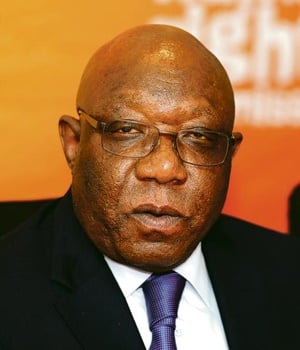
In October 2016, Thuli Madonsela’s term as Public Protector ends. Kavisha Pillay and Nosimilo Ramela look at how the office has grown since its establishment, and outline some of the highlights and lowlights of those who’ve had the job
Competent: Baqwa
In 1995, then president Nelson Mandela appointed Judge Selby Baqwa as the country’s first Public Protector.
Baqwa has been praised for his contribution to establishing the Office of the Public Protector and raising awareness about the institution, its mandate and services. However, he was also criticised for his apparent bias towards individuals in the ANC.
When Baqwa was appointed in October 1995, there was an immediate influx of complaints. By April 1996, the office and its eight employees received an average of 200 complaints a week.
Baqwa focused on making the Public Protector accessible to all by establishing provincial and regional offices, as well as outreach visiting points. Former chief investigator Gary Pienaar says Baqwa significantly expanded the office’s investigative skills capacity and initiated an outreach programme to raise awareness about the Public Protector.
Baqwa, he says, “was articulate, open and urbane, inspiring confidence among staff, complainants and the general public”.
“He established a professional and collegial atmosphere in the office, which encouraged investigators to act with integrity, to learn and grow, and to show initiative, including proposing and conducting own-initiative investigations,” says Pienaar.
By the time Baqwa left in 2002, the office had more than 200 staff members in all nine provinces.
Baqwa was credited for his contribution to chapter M of the Public Service Regulations, which serves as an administrative guide to ethical and efficient conduct in the public service, as well as establishing positive relationships with the International Ombudsman Institute and other chapter 9 institutions.
In 1999, Baqwa initiated an investigation into the then director-general of home affairs, Albert Mokoena, who was accused of running a private basketball team for his office and filling it with undocumented immigrants. Pienaar says Baqwa’s firmness resulted in Mokoena’s resignation.
That same year, he recommended that the ANC take action against then Mpumalanga premier Ndaweni Mahlangu, who suggested that it was okay for politicians to lie. The provincial legislature complied and Mahlangu was publicly reprimanded.
In 2000, ANC members moved to censure Baqwa when he urged Parliament to act against then minerals and energy minister Penuell Maduna. He found that Maduna accused then Auditor-General Henri Kluever of helping to cover up a R170 million theft of oil from the Strategic Fuel Fund, despite knowing the allegation was false.
However, many have said that Baqwa was not as independent as he perhaps should have been. University of Cape Town professor Richard Calland calls Baqwa a “canny operator”, who was cautious during the establishment of the office to “not upset too many political apple carts too early in the life of a new institution. Prudence was the watchword of his investigations.”
The first major corruption controversy in the Mandela administration emerged in 1996 when tendering processes were flouted in the production of the musical Sarafina II. Then health minister Nkosazana Dlamini-Zuma was accused of abusing public funds and misleading Parliament. Baqwa came under scrutiny for placing the blame on a mid-level official to shield Dlamini-Zuma.
During Baqwa’s term, the Public Protector was also tainted after Parliament established a joint investigating team consisting of members from the Public Protector, the office of the Auditor-General and the National Prosecuting Authority to investigate the arms deal.
Pienaar says: “The reputation of the office was dented by the joint investigating team’s misplaced trust in [then president Thabo Mbeki’s] credibility when some findings were adjusted slightly. The team’s willingness to give the benefit of the doubt to the integrity of the leadership of the democratic struggle turned out to be an error of judgement. The result was that identified evidence of misconduct could not be completely pursued and verified, and full responsibility could not be apportioned.”
In 2012, Baqwa was appointed a judge of the north and south Gauteng high courts.
Shocking: Mushwana
President Thabo Mbeki’s appointment in 2002 of Lawrence Mushwana, a deputy chairperson in the National Council of Provinces, was roundly criticised. Despite opposition-party concern that his allegiance to the ANC would taint the independence of the office, Mushwana received the 60% vote in Parliament that he needed to secure his appointment.
During his tenure, Mushwana expanded Baqwa’s outreach programme, which saw provincial offices sending two investigators out into small towns and townships for up to four days a week.
“Mushwana was a committed supporter of the establishment of satellite offices in the larger provincial towns, thereby extending the reach of the office and enhancing accessibility and access to justice,” says Pienaar.
By the time Mushwana left office, the Public Protector received an average of 13 000 complaints a year.
Public Protector Thuli Madonsela credits Mushwana with creating remedial action for investigations, which the Constitutional Court last week confirmed is binding.
“Advocate Mushwana was the first Public Protector to create concrete remedies. We speak today about government being responsible for doing something concrete to fix the problem it has created through improper conduct because Advocate Mushwana did that,” says Madonsela.
But Mushwana’s soft findings and remedial action for high-profile cases led to few or no consequences for offenders and tainted the Public Protector as an ANC lapdog.
In 2004, Mushwana found that the appointment of Robert McBride as Ekurhuleni Metro police chief was above board, despite the fact that, at the time, McBride did not have the relevant experience and qualifications. Mushwana endorsed the appointment because former national police commissioner Jackie Selebi “waived the requirements that McBride had to be a member of the metro police”.
That same year, then deputy president Jacob Zuma filed a complaint with Mushwana about the way in which the Scorpions were investigating his involvement in the arms deal. Zuma complained that information was deliberately leaked to tarnish his name. Then national director of public prosecutions Bulelani Ngcuka and Penuell Maduna later said there was a prima facie case of corruption against Zuma. Mushwana found that Ngcuka and Maduna’s statement was damaging to Zuma’s image.
In 2006, Mushwana found that then deputy president Phumzile Mlambo-Ngcuka did not abuse her official VIP transport and security arrangements by allowing her family to travel with her on holiday in an SA Air Force plane. She also failed to declare her “gift” of free accommodation. He merely recommended the draft Presidential Handbook be finalised.
In 2005, during the Oilgate scandal, also involving Mlambo-Ngcuka, Mushwana investigated allegations that she influenced PetroSA to advance payments to Imvume Management, which paid a company belonging to her brother. Pienaar says Mushwana’s “report found that the Public Protector could and needed to do nothing about this outrageous abuse. A court subsequently ordered the Public Protector to undertake a full and proper investigation.”
Mushwana is now the chair of the Human Rights Commission.
Fabulous: Madonsela
Madonsela has been the country’s most celebrated Public Protector. Her legacy will be prominently associated with her Secure in Comfort report, which found that President Jacob Zuma unduly benefited from taxpayer-funded upgrades to his Nkandla residence that were not related to security.
After two years of criticism, and denials that Zuma was compelled by the report to pay anything towards the upgrades, Jeremy Gauntlett, Zuma’s advocate, conceded in the Constitutional Court that his client was bound by the finding. This was a vindication of Madonsela, who had been subjected to fierce attacks by ANC MPs, and was even accused of being a CIA spy.
The Constitutional Court declared the actions taken by Zuma and the National Assembly to exonerate him “inconsistent” with the Constitution and invalid, and ordered National Treasury to determine how much Zuma should repay the fiscus.
There is a great symbolic and real world importance in a Public Protector holding the president, the country’s highest-ranking politician, to account. The Constitutional Court’s ruling was a resounding vindication of the jurisdiction and centrality of the Public Protector in protecting our most fundamental constitutional values. The court characterised the Public Protector as an independent and essential fighter against public maladministration – a David opposing the state’s mighty Goliath.
Madonsela’s reports have dispatched several Cabinet ministers and one police commissioner.
Bheki Cele was fired as national police commissioner in 2012 after Madonsela found he was involved in improper conduct and maladministration when the police entered into a R500 million lease deal for a building in Pretoria. Former public works minister Gwen Mahlangu-Nkabinde was also accused of maladministration and lost her job in a 2011 Cabinet reshuffle.
Former cooperative governance and traditional affairs minister Sicelo Shiceka faced numerous allegations of misusing taxpayers’ money, including spending state funds on luxury hotel stays, limousines and first class plane tickets for personal flights. Parliament’s ethics committee asked the Public Protector to investigate and her report found that Shiceka violated the Constitution and the Executive Members’ Ethics Code by spending more than R1 million on travel expenses for himself, staff and friends. He was dismissed in October 2011.
It is not only politicians who have been called to account by the Public Protector’s office during Madonsela’s tenure.
She recommended action against SABC chief operating officer Hlaudi Motsoeneng for giving himself exorbitant pay hikes and forging his matric certificate.
She also found that passenger rail agency Prasa’s former boss Lucky Montana should be held personally liable for failing to comply with supply chain management policy, and approving inappropriate tender awards. Montana had been fired the month before the report came out.
Independent Electoral Commission chairperson Pansy Tlakula resigned after a Public Protector report found her responsible for gross maladministration following the irregular leasing of the commission’s new headquarters. The Financial Times quoted Madonsela as saying the decision was tough because she regarded Tlakula highly.
In a 2013 survey conducted by Freedom House, Madonsela was praised widely for her work in protecting South Africa’s democracy. The survey suggested she was a well-known and powerful force against corruption. In 2014, Time magazine ranked Madonsela among the top 100 most influential people in the world under the category of leaders, praising her as “an inspirational example of what African public officers need to be”.
But the high profile had a flip side. ANC deputy secretary-general Jessie Duarte criticised her for being “populist” after the release of her Nkandla report. Others have felt that the office has become too centred on the Public Protector as an individual and there wasn’t enough recognition that she was part of a team.
As the first woman in the job, Madonsela set a powerful example. In a 2013 interview, Madonsela remarked that “the firmness with which I make decisions was not expected from a woman”.
TALK TO US
Who do you think should become the next Public Protector, and what skills should he or she have?
SMS us on 35697 using the keyword PROTECT and tell us what you think. Please include your name and province. SMSes cost R1.50




 Publications
Publications
 Partners
Partners








